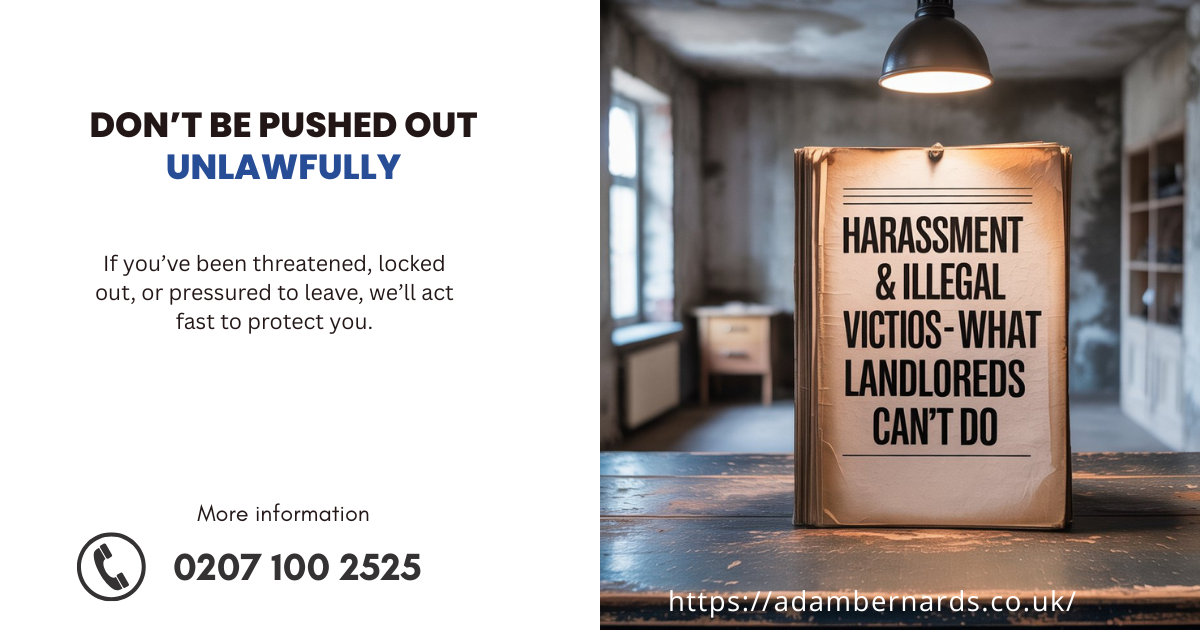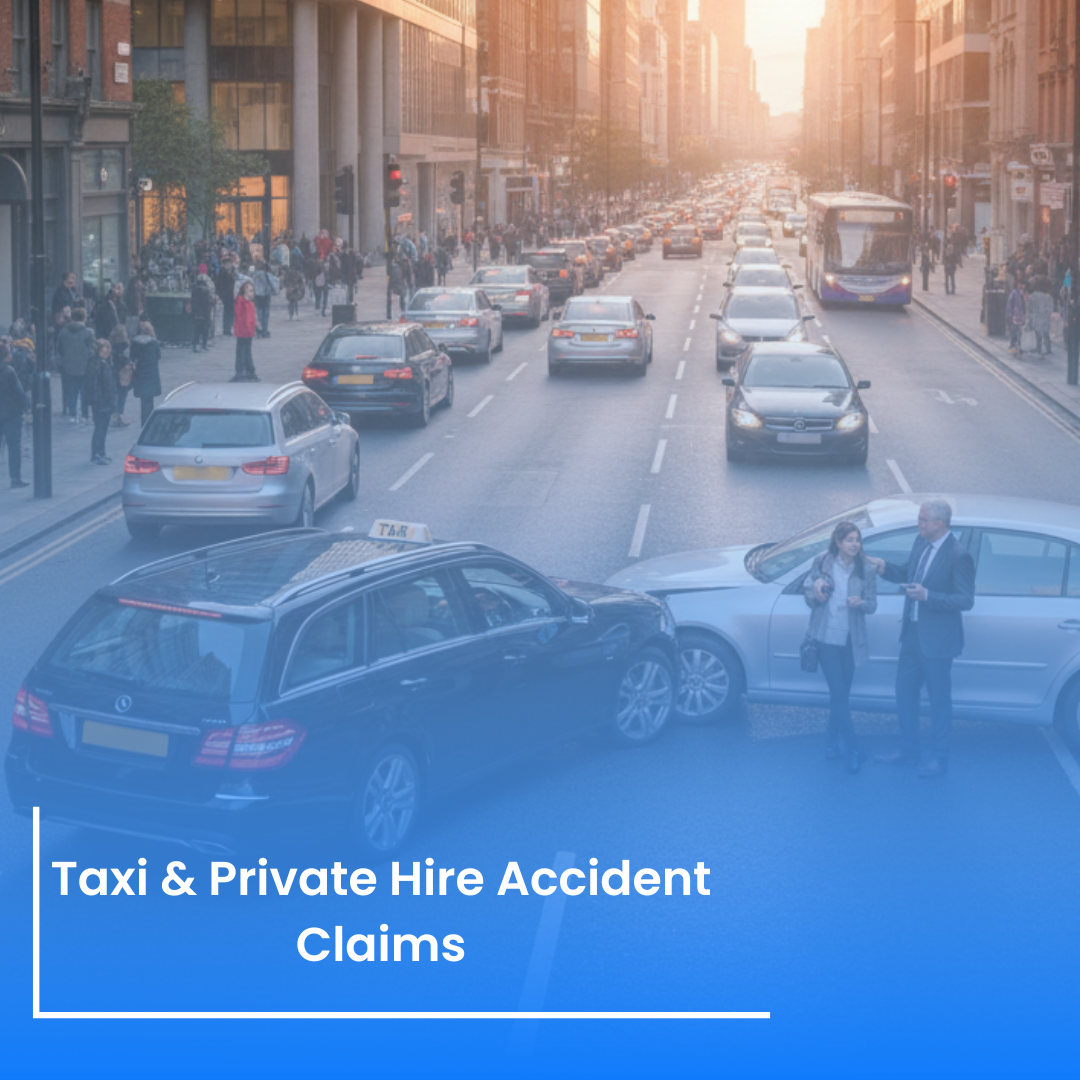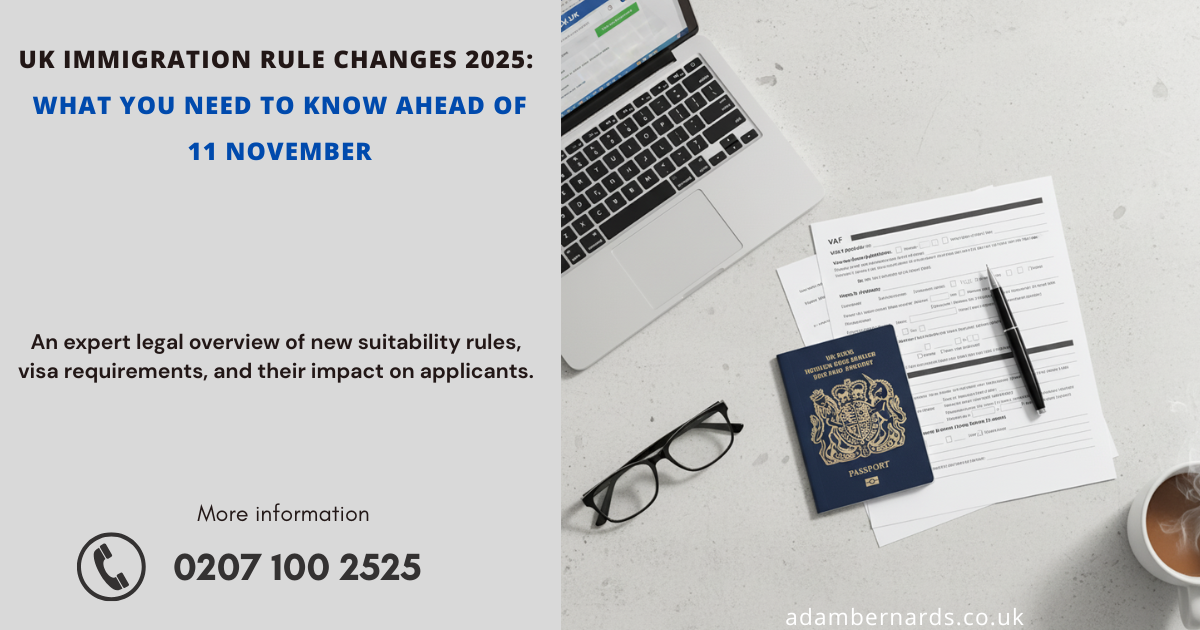Illegal Eviction or Landlord Harassment in the UK? Here's What You Need to Know
Adam Bernard Solicitors will move quickly to protect you if someone has intimidated you, locked you out, or coerced you to leave.
Renting a place in London should be easy. You pay your rent, keep your home in good shape, and expect a safe and fair place to live. Some landlords, on the other hand, go too far and use threats, pressure, or even unlawful means to get tenants to leave.
If this is occurring to you, you should know that you are not alone and that it is against the law.
One of the best law firms in London, Adam Bernard Solicitors, has helped many tenants fight illegal evictions and sue bad landlords. This is what landlords can’t do legally, how to know your rights, and how we can help you right now.
What does it mean to be a landlord in the UK?
If your landlord does something that makes you feel uncomfortable, unsafe, or that you have to leave your house, that’s harassment. The Protection from Eviction Act 1977 makes it plain that this kind of action is illegal in the UK.
Harassment doesn’t always have to be loud or violent; it can just be quiet or look like typical landlord activity. For instance, your landlord can show up at your house without warning, put off important repairs, or keep texting you to complain. If someone does these things over and over or with the goal of getting you to leave, they may be considered harassment.
Other forms include:
- Turning off the electricity, gas or water
- Threatening to kick you leave without giving you legal notice
- Changing the locks while you’re gone
- Shouting, threatening, or verbally abusing someone
This kind of treatment is not only wrong, it’s against the law.
Is it possible for a landlord in the UK to kick you out without warning?
A lot of tenants don’t know that a landlord can’t just kick them out even if they’re late on rent or at the end of their lease. It is important to follow the law exactly.
First, the landlord must offer sufficient written notice, which is usually either a Section 21 (no-fault eviction) or a Section 8 (eviction with cause). They must go to court and ask for a possession order after the notice period is over. A landlord can only ask a licensed bailiff to carry out the eviction when a court order has been granted.
If your landlord skips any of these stages, including physically removing you, throwing out your things, or changing the locks, they are evicting you illegally. In the UK, this is a crime.
How to Tell if You're Being Illegally Evicted or Harassed
Harassment and illegal eviction usually start off small and get worse. You might not know what’s going on until you feel like you can’t get out of your house or that it’s not safe. Some signs that something is wrong are:
- Being told to leave without a formal notice or a judicial order
- Utility services being turned off without any reason or explanation
- Being told to go immediately or else
- Weird people coming to look at your house before you agree to move
- The landlord won’t take your rent for no reason
These scenarios cause stress and confusion, which is what some landlords want. But keep in mind that you don’t have to put up with this.
If someone is bothering you or threatening to kick you out, here's what to do.
Don’t wait if you think your landlord is attempting to get you to leave or is bothering you. You can protect yourself by following these procedures.
First, gather proof. This means keeping texts, emails, or notes, taking images of any damage, and keeping track of any uninvited visits. If something happens in person, write down what was said, when it happened, and how it made you feel.
After that, get in touch with your local municipality. Tenancy Relations Officers in many London boroughs look into complaints and can penalise or take landlords to court.
You should also get in touch with Shelter UK or Citizens Advice right away for help. These groups give you free, trustworthy assistance to help you know your rights and choices.
But if harassment or illegal eviction is already happening, going to court is usually the quickest and most efficient method to halt it. We may secure emergency court orders at Adam Bernard Solicitors to stop your landlord right away. In rare situations, we can also help you get back into your property if you’ve been locked out. You might also be able to get money.
Send us an email at info@adambernards.co.uk to talk to a housing lawyer in private today.
You are legally protected as a tenant in the UK, even if you don’t have a documented tenancy agreement. Your landlord has to let you live in peace in your home.
- You have the right to live in your home without being bothered or harassed.
- Get adequate notification before any eviction process
- Don’t let your landlord in unless you’ve been told at least 24 hours in advance
- Get the repairs you need and live in a safe place.
Things Landlords Can't Do
Landlords often forget—or don’t care about—their legal duties.
To be clear, they can’t:
- Come into your home without your consent or notification
- Stop giving you gas, water or electricity to get you to leave.
- Threaten you or your loved ones
- Change locks without a court order to remove you
- Evict you without going through the legal process, like going to court
Adam Bernard Solicitors Can Protect Your Rights
Illegal eviction and harassment can be more than simply stressful; they can also make you lose your house, your job, and your peace of mind. That’s why we move promptly and firmly to keep our clients safe.
People all around London know that Adam Bernard Solicitors fights for renters and makes landlords pay for their actions. We can help you whether you rent a solitary room, share a house, or live in a flat:
- Stop the illegal eviction
- Return to your home
- Get paid for the damage
Get in touch with us today at info@adambernards.co.uk. You can also book a free first consultation on our website.
Frequently Asked Questions (FAQs)
Can my landlord evict me without notice in the UK?
No, your landlord cannot evict you without proper legal notice. In most cases, they must serve a Section 21 or Section 8 notice, wait for the notice period to end, and then obtain a court order. Locking you out or removing you without following this process is considered illegal eviction under UK law.
What is considered landlord harassment in the UK?
Landlord harassment includes any behaviour intended to pressure you to leave your home or make your life difficult. This can include entering without notice, turning off utilities, verbal threats, refusing repairs, or sending frequent messages. Harassment is a criminal offence under the Protection from Eviction Act 1977.
Can my landlord lock me out without notice?
Absolutely not. Locking you out of your home without a court order and bailiff is illegal. This is known as a self-help eviction and can lead to your landlord facing criminal charges. If this happens, contact the police or a housing solicitor immediately.
What should I do if I’m being threatened with eviction by my landlord?
Stay calm and document everything—texts, emails, or conversations. Do not leave your home. Contact a solicitor or your local council’s Tenancy Relations Officer. You can also reach out to Adam Bernard Solicitors at info@adambernards.co.uk for urgent legal help in London.
How do I prove landlord harassment?
Keep a clear paper trail. Save messages, emails, take photos, record unwanted visits, and keep a diary of incidents. This can serve as evidence if you take legal action or apply for an injunction to stop your landlord’s behaviour.
What are my rights as a tenant in London?
As a tenant, you have the right to:
- Live in your home without harassment
- Get 24 hours’ notice before landlord visits
- Receive repairs and safe living conditions
- Be evicted only through the courts
Even if you don’t have a written tenancy agreement, you are protected by UK law.
Can I claim compensation for illegal eviction in the UK?
Yes. If your landlord has illegally evicted you, you may be entitled to compensation for emotional distress, financial loss, and the cost of temporary housing. Our team at Adam Bernard Solicitors can help you claim what you’re owed.
What steps should I take if I’m facing illegal eviction?
- Do not leave the property voluntarily
- Contact a solicitor immediately
- Report it to your local council or the police
- Reach out to Shelter UK or Citizens Advice
- Keep all evidence of harassment or threats
Need urgent legal help? Email info@adambernards.co.uk today.
What is a Section 21 notice?
A Section 21 notice is a legal notice landlords use to evict tenants without giving a reason. It’s also called a “no-fault eviction.” However, the landlord must still follow proper procedures, including giving at least 2 months’ notice and applying for a court possession order if the tenant doesn’t leave.
Can I be evicted for complaining about my landlord?
No — this is called a retaliatory eviction, and it may be unlawful. If you reported disrepair or harassment and your landlord responded by serving a Section 21 notice, the eviction can often be challenged in court, especially if the council issued an improvement notice.
What compensation can I claim for illegal eviction or harassment?
If you’ve been illegally evicted or harassed, you may be entitled to:
Compensation for distress and inconvenience
Money for property loss or damage
Recovery of moving costs or emergency accommodation
Punitive damages in serious cases
Do I need a tenancy agreement to be protected?
No, even without a written tenancy agreement, you have rights under UK housing law. Your landlord must still follow the proper legal process to evict you and cannot harass you.
How quickly can Adam Bernard Solicitors help me?
In urgent cases, we can often:
Apply for an emergency injunction within 24 hours
Stop the eviction or harassment immediately
Begin a claim for compensation the same week
Contact us now at info@adambernards.co.uk or book a free consultation.














